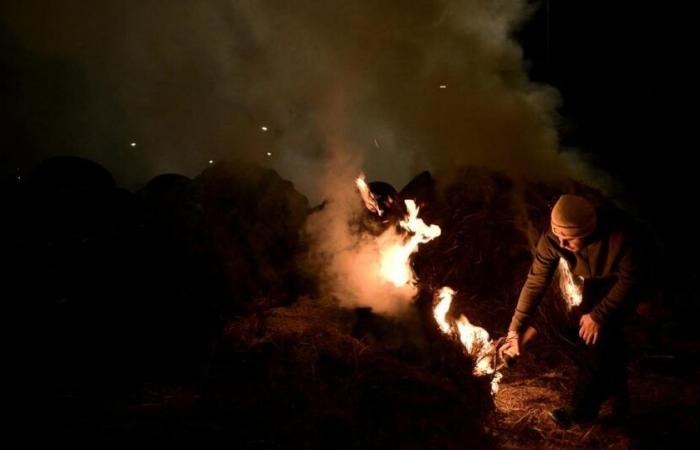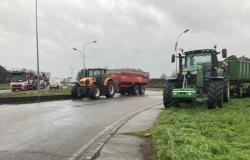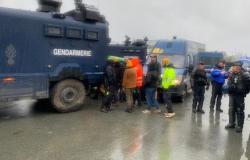
The agricultural union, known to be close to the far right, started an arson attack in a building of the departmental directorate of territories and the sea and is still blocking the site of the commercial port of Bordeaux.
They want to fight. The Rural Coordination (CR), an agricultural union known to be close to the extreme right and the main mobilized organization, maintains its blockade of the commercial port of Bordeaux this Thursday, as well as the pressure on the Barnier government. Minister Annie Genevard is also making her first visit to the field today since the return of farmers to the streets, the mobilization now seeming to be mainly confined to the virulent actions of the yellow hats of the Rural Coordination.
The commercial port of Bordeaux, invaded on Wednesday evening by CR demonstrators, was still blocked this Thursday morning. The country's second agricultural union claims around 200 demonstrators and some 80 tractors on site, “with people still arriving”. The Gironde prefecture mentioned the presence this Wednesday evening of around thirty tractors.
“We are stuck as long as Ms. Genevard and Mr. Barnier do not put in place solutions for the profession. Structural things, (…), we don't want a little money today to return to our farms, we want reforms to live, to have a decent salary”declared Aurélie Armand, director of the CR of Lot-et-Garonne. “The weather is on our side because when it rains we can't work on the farms, so that's very good”she said, under heavy rain in Gironde, with the passage of the Caetano storm.
A “slight decline” in mobilization
In the Landes, the prefect condemned “the damage committed by members of the Rural Coordination” this Wednesday on sites of the Mutualité sociale agricole targeted by wild dumps, and of the departmental directorate of territories and the sea, with a fire “deliberately triggered” within its enclosure. The prefecture will file a complaint. On Europe1/Cnews, the Minister of the Interior Bruno Retailleau reiterated that if “the cause” of the anger of the farmers was “just”there was “limits”. They have “perfectly the right to demonstrate, but there are red lines”, “no encystment”, “no blocking”he insisted.
The mobilizations, also targeting distribution purchasing centers, are concentrated in the South-West, stronghold of Rural Coordination, a union competing with the majority FNSEA-Young Farmers (JA) tandem. The authorities note a “slight decline” of mobilization across the country compared to the beginning of the week, when FNSEA and JA were also on the ground. Minister Annie Genevard is expected mid-morning on a farm 10 km northeast of Béthune, and plans to meet with farmers there, according to her office. She will then go to an agricultural educational establishment in Arras.
A blockage of the free trade agreement
Wednesday evening, Annie Genevard reiterated the government's opposition to the free trade agreement negotiated between the European Union and Latin American Mercosur countries, and its desire to bring together a blocking minority within the EU to prevent it, an effort with uncertain results, while a debate on this subject will be held in the National Assembly next Tuesday. “No one can say today that there is no blocking minority. We are working hard on it”promised Annie Genevard on BFMTV. “We are going to do everything we can to prevent this agreement which is bad.”
This new episode of agricultural demonstrations comes a few weeks before professional elections. The CR, which presides over three chambers of agriculture, including a veritable barony with factional overtones in Lot-et-Garonne, hopes on this occasion to break the hegemony of the majority alliance FNSEA-JA and delight “15 to 20 rooms” additional. The president of the FNSEA Arnaud Rousseau announced that the next demonstrations led by its members would take place next week, “Tuesday, Wednesday and Thursday”, “to denounce obstacles to agriculture”.
FNSEA and JA had warned that they would mobilize until mid-December against the Mercosur agreement, against the standards they consider excessive and for a better income. Third representative union, the Peasant Confederation also organizes occasional actions, against free trade treaties or energy installations on agricultural land, asking the government to support farmers who take up environmental and climatic challenges rather than agro- industry.





